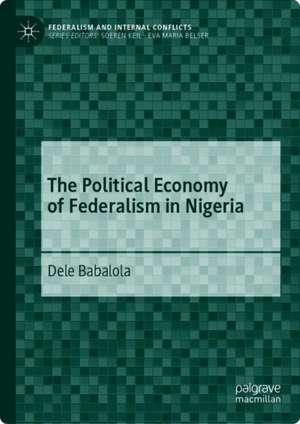The Political Economy of Federalism in Nigeria: Federalism and Internal Conflicts
Autor Dele Babalolaen Limba Engleză Hardback – 10 ian 2019
Preț: 417.13 lei
Preț vechi: 453.40 lei
-8% Nou
Puncte Express: 626
Preț estimativ în valută:
79.83€ • 86.68$ • 67.05£
79.83€ • 86.68$ • 67.05£
Carte tipărită la comandă
Livrare economică 18-24 aprilie
Preluare comenzi: 021 569.72.76
Specificații
ISBN-13: 9783030054922
ISBN-10: 3030054926
Pagini: 170
Ilustrații: XIII, 180 p. 2 illus., 1 illus. in color.
Dimensiuni: 148 x 210 mm
Greutate: 0.39 kg
Ediția:1st ed. 2019
Editura: Springer International Publishing
Colecția Palgrave Macmillan
Seria Federalism and Internal Conflicts
Locul publicării:Cham, Switzerland
ISBN-10: 3030054926
Pagini: 170
Ilustrații: XIII, 180 p. 2 illus., 1 illus. in color.
Dimensiuni: 148 x 210 mm
Greutate: 0.39 kg
Ediția:1st ed. 2019
Editura: Springer International Publishing
Colecția Palgrave Macmillan
Seria Federalism and Internal Conflicts
Locul publicării:Cham, Switzerland
Cuprins
1 Introduction: Conceptual Approaches to Nigerian Federalism.- 2 Nigeria, a Federal State and Federal Society: the Origins.- 3 Oil-Centrism and Nigeria’s Political Economy.- 4 Revenue Allocation in Nigeria.- 5 Secession and Self-determination in Nigeria.- 6 Nigeria: A Federation in Search of ‘True Federalism’.- 7 Conclusion: Addressing Nigeria’s Ailing Federal System.
Recenzii
“The book by Dele Babalola, The Political Economy of Federalism in Nigeria … aims to demonstrate the significance of the political economy, fiscal federalism and revenue sharing, in the Nigerian Federation.” (Adriano Dirri, Nomos, Issue 1, 2019)
Notă biografică
Dele Babalola is Senior Lecturer at the Department of International Relations and Diplomacy at Baze University, Nigeria. He formerly taught at the School of Politics and International Relations, University of Kent, UK. He edited Nigeria, a Country under Siege: Issues of Conflict and its Management (with H. Onapajo, 2018).
Textul de pe ultima copertă
This book uses the political economy approach to examine the relative failure of federalism in Nigeria. It shows the nexus between the political and the economic aspects of the country’s federalism. The central feature of Nigeria’s political economy is the relationship between oil resources and the state. The author argues that the inability of the federal government to distribute the oil wealth fairly amongst the component units contributes to the dysfunctional character of the federal system. This deficiency is rooted in the country’s unbalanced political economy, which promotes over-dependency on oil and consequently an over-centralised federal system. The book concludes that despite its complexities, federalism has become the basis for the country’s stability. Therefore, ethno-regional demands for ‘true federalism’ will remain until the political elite reform the ailing federal system.Dele Babalola is Senior Lecturer at the Department of International Relations and Diplomacy at Baze University, Nigeria. He formerly taught at the School of Politics and International Relations, University of Kent, UK. He edited Nigeria, a Country under Siege: Issues of Conflict and its Management (with H. Onapajo, 2018).
Caracteristici
Contributes to the understanding of the dynamics of federalism in a multinational state Demonstrates that there is a dialectical relationship between Nigeria's political economy and its federal system, with the former shaping the latter Shows how the federal political framework continues to be a facade masking the economic reality of a failed distribution of national resources














